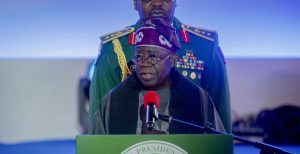From Victor Osula. Abuja

Nigeria has achieved a major milestone in its fight against money laundering, terrorism financing, and proliferation financing following its official removal from the grey list of the Financial Action Task Force (FATF).
FATF President, Elisa de Anda Madrazo, announced the development on Friday during the body’s plenary session in Paris, France.
She praised Nigeria for demonstrating strong political will and effective inter-agency collaboration in tackling financial crimes under the administration of President Bola Tinubu.
FATF is the world’s foremost body for combating money laundering, terrorist financing, and proliferation financing. Its grey list comprises countries under increased monitoring due to strategic deficiencies in their anti-money laundering and counter-financing of terrorism frameworks.
Nigeria was added to the list following its 2021 evaluation but has since undertaken sweeping reforms across its financial and security architecture.
The delisting follows the successful completion of an Action Plan designed to strengthen Anti-Money Laundering and Counter-Financing of Terrorism (AML/CFT) measures.
Madrazo noted that Nigeria’s removal came after more than two years of sustained reforms and international engagement.
She said the country’s progress reflected not just political promises but measurable institutional changes in law enforcement and financial supervision.
“In Nigeria, we have seen that political commitment has translated into real change on the ground. After sustained efforts over the past two years, Nigeria has demonstrated a stronger capacity to investigate and prosecute crimes such as drug trafficking and terrorist financing,” she said.
The FATF president also commended Nigeria for enhancing transparency in beneficial ownership structures and for strengthening oversight of non-financial sectors, particularly real estate.
She attributed the achievement to the Nigerian government’s “whole-of-government” approach, which involved multiple ministries and agencies working together to ensure compliance with FATF standards.
Madrazo highlighted the leadership of the Nigerian Inter-Ministerial Committee on Anti-Money Laundering and Countering the Financing of Terrorism and Proliferation Financing (AML/CFT/PF), chaired by the Attorney-General of the Federation and Minister of Justice, Lateef Fagbemi (SAN), alongside the Minister of Finance, Wale Edun, and the Minister of Interior, Olubunmi Ojo.
According to her, the presence of three Nigerian ministers at the plenary underscored the administration’s commitment to sustaining the fight against financial crimes and illicit financial flows.
Responding on behalf of the Nigerian delegation, Finance Minister Wale Edun said the country was honoured to have contributed its experience and expertise to the global campaign against financial crimes threatening international stability.
Edun expressed appreciation to Nigeria’s international partners — including France, Germany, the United Kingdom, the United States, and the European Commission — for their support throughout the reform process.
“With the resolve and dedication of the men and women back home, we will continue to work towards a safer and more secure Nigeria,” Edun said.
Alongside Nigeria, three other African countries — Mozambique, Burkina Faso, and South Africa — were also delisted from the FATF grey list during the plenary.
Meanwhile, Tinubu described the development as a major milestone in Nigeria’s pursuit of economic reform, institutional integrity, and global financial credibility.
He said the delisting was a testament to his administration’s strong political will, coordinated reforms, and international cooperation over the past two years.
“This marks a major milestone in Nigeria’s journey toward economic reform, institutional integrity, and global credibility,” Tinubu said.
He recalled that FATF had, in February 2023, identified deficiencies in Nigeria’s AML/CFT framework, which his administration viewed not as a setback but as a call to action.
Under his leadership, Nigeria implemented far-reaching legal, institutional, and operational reforms aimed at strengthening financial transparency and governance.
According to the President, the reforms were coordinated by the Nigerian Financial Intelligence Unit (NFIU), in collaboration with the Office of the Attorney-General of the Federation, the Ministry of Finance, the Ministry of Interior, and other key institutions.
Tinubu commended the collective efforts of several ministries and agencies, including the Secretary to the Government of the Federation, the Ministers of Aviation, Defence, Budget and Economic Planning, Foreign Affairs, Solid Minerals, and the National Security Adviser.
He also acknowledged the support of the National Assembly and the Judiciary.
The President gave special recognition to Ms. Hafsat Abubakar Bakari, Director and Chief Executive Officer of the NFIU, for her leadership and her team’s dedication in ensuring the timely and complete implementation of Nigeria’s FATF Action Plan.
“The delisting reaffirms Nigeria’s commitment to global financial transparency and positions our nation as a trusted partner in the international financial system,” Tinubu added.

